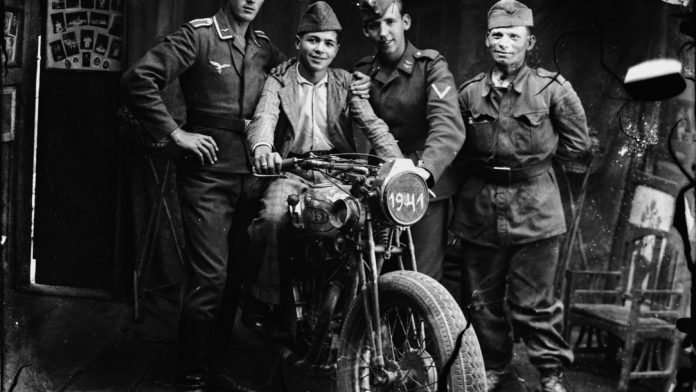(THIS ARTICLE IS MACHINE TRANSLATED by Google from Norwegian)
"There are three ways to greet a Jew: Mr. Dirty Jew, your Dirty Jew, and go to Hell, your Dirty Jew," wrote the Romanian Jew and Doctor Emil Dorian in his diary in the spring of 1940. This bitter joke pervaded among ordinary people in Bucharest and reflected the situation of the Romanian Jews at that time.
Dorian's diary is the starting point for the documentary Dead Nation from Romanian filmmaker Radu Jude. The director has made a thought-provoking documentary in a minimalist visual style. The entire film is based on photographs taken in a photo studio in Romania in the 1930s-1940s. The photographs almost never function as illustrations for the diary texts, but rather form an ironic counterpoint.
The photographs are portraits of smiling Romanians in traditional folk costumes, pictures from family events, of church leaders, soldiers and solemn celebrations. They appear at the same time as a narrative voice describing how the persecution of the Jews escalated, with Dorian's diary notes intertwined with radio news and patriotic songs. The photographs and diary excerpts span a decade, until 1946.
Jude's juxtaposition implies that the Romanians had a finger in the game regarding the ill-treatment of the Jews during the Holocaust. It is startling to see a film from a Romanian filmmaker who effortlessly criticizes his own homeland at a time when many regional authorities are trying to launder participation and participation during the Holocaust.
Disclaimer
Poland has recently passed laws that make it punishable to imply that the nation has been responsible for Holocaust-related crimes, and similar laws have been passed in Ukraine. This is criticized as an attempt to conceal the cooperation between the Nazis and the citizens of these countries.
Lithuania, Latvia and Hungary have also introduced policies aimed at denying their commitment. In the case of Romania, a country that has the dubious "honor" of killing more Jews than any other Nazi-allied country (estimated at 300 people), it is positive that Jade has been able to make the film apparently without interference.
Dorian's notes tell of rising Romanian anti-Semitism that reached a dangerous level long before the country supported the Nazis.
It is startling to see a filmmaker who effortlessly criticizes his own homeland in the time when many are trying to launder participation and participation during the Holocaust.
In 1938, Dorian lost his job as a physician, when the authorities "discouraged" Jews from working for state organizations. Jewish patients were banished from hospitals, the state radio channel played songs about Jews "sucking our blood," and synagogues were burned down. In 1939, Jewish medical students were refused exams.
Prohibited from treating Christian patients
In 1940, Jewish soldiers were resolutely thrown off the train and killed by their fellow soldiers, and the same year Jewish doctors were forbidden to treat Christian patients.
In 1941, women participated in a program that cut out the tongues and eyes of the Jews. In 1942, deadly gas was tested on the Jews, and Romanian soldiers participated in the liquidation of Jewish communities in Odessa and other parts of Ukraine.
Dorian's diary sheds light on who (in the West) knew what happened during the Holocaust, when they knew it – and why no more was done to stop the atrocities.
When he, as a physician in Bucharest, had information on the gasification of Jews in 1942 and knew of a train through Romania transporting Jews to Poland – where "their fate was known", as Dorian writes – it is really possible that the Allies did not know about the gas chambers who was expecting the Jews?
scapegoats
Jude's decision to stick to a minimalist narrative style creates a significant emotional impact, but at the same time causes some problems. Viewers with no background knowledge of Romania's role in World War II may have trouble following the historical events that are hinted at, but not explained: During World War II, Romania was neutral at first, but then partnered with Hitler to invade Ukraine before switching to the Allies' side and finally sought an alliance with the Soviet Union.
Dead Nation is an important film that illustrates how a minority group is made into scapegoats, and how this is growing rapidly and unabated with disastrous results. The film will hopefully be seen by many, especially in Romania and Eastern Europe.
Translated by Iril Kolle


